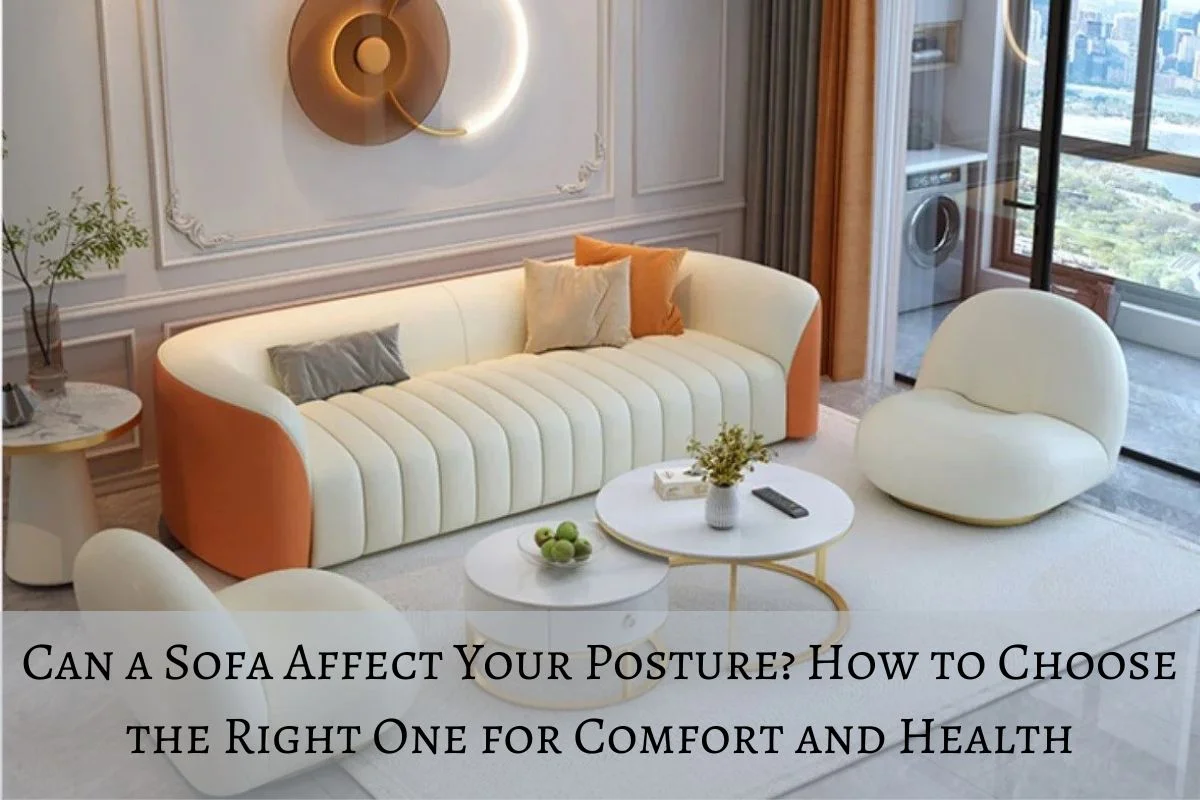Can a Sofa Affect Your Posture? How to Choose the Right One for Comfort and Health
Your sofa isn’t just a piece of furniture; it’s where you binge-watch your favorite shows, curl up with a book, or catch a quick nap. But have you ever considered how it might be affecting your posture? Spending hours on an unsupportive sofa can lead to back pain, stiffness, and even long-term health issues. The wrong sofa can turn relaxation into a recipe for discomfort. In this blog, we’ll explore how sofas influence posture, the features to look for in a posture-friendly design, and tips to ensure your next sofa is as good for your health as it is for your living room.
Introduction: Why Your Sofa Matters
Your sofa isn’t just for lounging; it’s a daily companion that influences your health. Spending hours on an unsupportive sofa can impact your posture, leading to aches, stiffness, or long-term issues. Many of us prioritize style and affordability when choosing a sofa, but comfort and ergonomics are equally essential. A well-designed sofa provides more than a place to sit—it ensures your spine stays aligned and your body supported. This blog explores how sofas can affect posture and offers tips for choosing one that balances aesthetics with health. After all, a healthy posture begins at home—on the right sofa!
The Connection Between Sofas and Posture
Sofas play a significant role in shaping your posture. Poorly designed sofas can cause you to slouch, slump, or sit awkwardly, straining your back, shoulders, and neck. Soft, saggy cushions provide little support, leading to misalignment of the spine and hips. Over time, these issues manifest as chronic discomfort or pain. Common signs that your sofa is harming your posture include stiffness, difficulty standing up, or aches after sitting. Recognizing the problem is the first step toward improvement. Understanding how your sofa contributes to these problems can guide you in selecting a healthier, more posture-friendly seating option.
Features of a Posture-Friendly Sofa
A posture-friendly sofa should balance comfort with support. Look for medium to firm cushions that prevent sagging while maintaining spinal alignment. Proper seat depth ensures your feet rest flat on the ground, and your knees are at a right angle. The backrest should offer adequate lumbar support, aligning the lower back’s natural curve. High backrests and adjustable headrests provide neck and upper back support. Armrests should be at a height that lets your shoulders relax. If possible, opt for sofas with reclining or modular features to suit different needs. These design elements combine to create a healthier sitting experience.
Sofa Science: Choosing the Right Materials for Ultimate Comfort and Support
The materials in a sofa can significantly influence its comfort and longevity. Breathable fabrics like cotton or linen keep you comfortable during extended sitting sessions, while durable leather or microfiber provides easy maintenance. Cushion filling also matters: high-density foam offers consistent support, while springs add resilience. Hypoallergenic options are ideal for sensitive users, reducing exposure to dust mites or allergens. Sofas made from sturdy, non-toxic materials ensure durability and safety. Remember, the right material doesn’t just complement your décor—it enhances your health by maintaining the sofa’s firmness and support over time, ensuring a comfortable and ergonomic experience.
Choosing the Right Sofa for You
Choosing the right sofa begins with understanding your needs. Consider your height, weight, and typical sitting posture. Ensure the sofa accommodates your household’s seating preferences—whether you sprawl, curl up, or sit upright. Test sofas in showrooms by sitting as you would at home; assess the seat height, depth, and firmness. Don’t forget the space—your sofa should fit your room’s layout without compromising mobility. Prioritize ergonomics over trends, as a stylish but unsupportive sofa isn’t worth the health trade-off. By combining functionality with design, you’ll find a sofa that’s as kind to your posture as it is to your eyes.
Maintenance Tips for Longevity
A sofa’s effectiveness depends on its condition. To maintain support and comfort, regularly fluff and rotate cushions to prevent sagging. Vacuum upholstery to keep dust and debris from accumulating, especially in crevices. Spot-clean stains promptly to avoid material deterioration. Inspect the frame and cushions for wear; address sagging or broken parts immediately. Investing in protective covers can prolong the life of your sofa and preserve its structure. Regular maintenance ensures your sofa remains a healthy, supportive part of your home, avoiding the discomfort that comes from sitting on worn-out furniture.
Complementary Practices for Better Posture
Your sofa is only part of the equation; healthy posture also requires mindful habits. Add lumbar pillows to fill gaps in support, or use footrests to keep your feet grounded. Avoid prolonged sitting by taking breaks to stretch or walk around every hour. When sitting, ensure your back is straight, shoulders relaxed, and feet flat on the floor. Keep electronics at eye level to prevent neck strain. These small adjustments enhance your sofa’s benefits and reduce strain on your body. Pairing a good sofa with healthy habits creates a lifestyle that prioritizes comfort and well-being.
Conclusion: Invest in Your Health
A sofa isn’t just furniture; it’s a foundation for comfort and health. The right sofa can prevent aches, improve posture, and enhance your overall quality of life. Investing in a well-designed, supportive sofa is an investment in your well-being. Choose a sofa that aligns with your needs, test it thoroughly, and maintain it regularly. Remember to incorporate healthy habits like proper sitting posture and frequent movement. By making thoughtful choices, you can create a living space that’s as functional as it is stylish, ensuring comfort and health for years to come. Your body will thank you!


